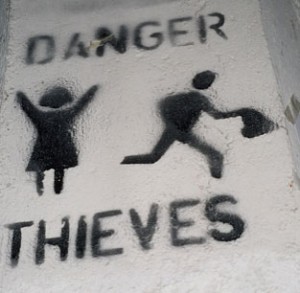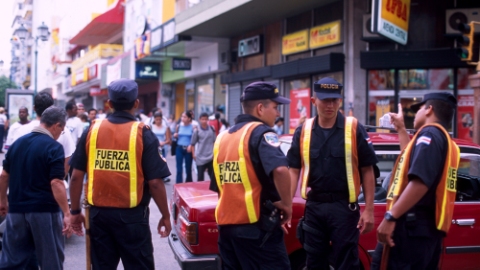Costa Rica is a beautiful country, absolutely noone argues with that! But is it safe? Many people wonder if Costa Rica has the same safety and security risks found in the rest of Latin America. This article will provide insight regarding general travel safety, the security of roads and water, terrorism, and crime.
 The good news is that there is an extremely low risk of terrorism. Costa Rica’s government does not have any enemies, mainly because of their stand on peace and purposeful lack of an army. Of course, terrorists may attack any country worldwide for an unwarented reason or to target visitors from enemy countries. Stay away from any protest, especially one made up of expatriots.
The good news is that there is an extremely low risk of terrorism. Costa Rica’s government does not have any enemies, mainly because of their stand on peace and purposeful lack of an army. Of course, terrorists may attack any country worldwide for an unwarented reason or to target visitors from enemy countries. Stay away from any protest, especially one made up of expatriots.
Violent and sexual crimes are still infrequent in Costa Rica. The crime to be aware of is the ever rising theft, especially against tourists. To reduce your risk of becoming a victim, simply try to fit in. If you are found looking lost, staring at a map, speaking English in a loud voice, and wearing flashy jewelry you will be seen as an easy opportunity target.
Always carry only the cash you need for the day and keep a careful eye on your belongings. If possible keep them on your lap with a strap around you. Avoid alleys or other dark unpopulated areas as well as money changers on the street.
A copy of your passport is sufficient proof of identity, so leave the original in a safebox. Look for official taxis (with a yellow triangle on the side, and a meter to count the cost). Don’t leave valuables in a car, accept help from strangers, or leave your drinks unattended. These are rules that apply in every country. Basically just use common sense.
Be aware that 911 is the emergency number in Costa Rica for police, firefighters, car accidents, and ambulances. Emergency officials regulate parks, closing them if there is danger such as volcanic eruptions, or posting signs to mark areas of caution such as cliffs. Mind all signs even if you don’t perceive a danger.
Driving is allowed with a foreign license or an international driving permit for the first 3 months you are in Costa Rica. Be aware of frequent road delays due to strikes, repairs, or conditions. Main routes are usually in fairly good conditions, while more rural areas have many potholes and dirt roads. Be cautious near bridges, as they are usually one way, even on a two way road, due to the fact that they are one car wide. Drivers tend to be reckless and ignore lights and stop signs. If you are in a collision you are not permitted to move the car-not even to the side of the road-until traffic police arrive.
Swimming safety is a big concern here because in Costa Rica there are rarely lifeguards and rip tides are very common. Stay where locals are to avoid particularly bad areas such as those with crocodiles! Any water tours such as rafting (or any risky tours like zip lining) should be done only with approved companies. Companies who have good standing with the ICT have their safety measures and insurance up to date.
If you are aware of your belongings and surroundings, and stay in populated areas and with approved tours you shouldn’t have any trouble with safety or security in Costa Rica!
By Kerry La

